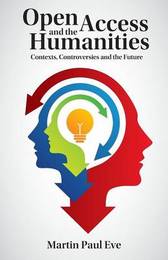
|
Open Access and the Humanities: Contexts, Controversies and the Future
Paperback / softback
Main Details
| Title |
Open Access and the Humanities: Contexts, Controversies and the Future
|
| Authors and Contributors |
By (author) Martin Paul Eve
|
| Physical Properties |
| Format:Paperback / softback | | Pages:226 | | Dimensions(mm): Height 216,Width 140 |
|
| Category/Genre | Encyclopaedias and reference works |
|---|
| ISBN/Barcode |
9781107484016
|
| Classifications | Dewey:001.30285 070.57973 |
|---|
| Audience | | Professional & Vocational | |
|---|
| Illustrations |
1 Tables, black and white; 6 Halftones, unspecified
|
|
Publishing Details |
| Publisher |
Cambridge University Press
|
| Imprint |
Cambridge University Press
|
| Publication Date |
27 November 2014 |
| Publication Country |
United Kingdom
|
Description
If you work in a university, you are almost certain to have heard the term 'open access' in the past couple of years. You may also have heard either that it is the utopian answer to all the problems of research dissemination or perhaps that it marks the beginning of an apocalyptic new era of 'pay-to-say' publishing. In this book, Martin Paul Eve sets out the histories, contexts and controversies for open access, specifically in the humanities. Broaching practical elements alongside economic histories, open licensing, monographs and funder policies, this book is a must-read for both those new to ideas about open-access scholarly communications and those with an already keen interest in the latest developments for the humanities. This title is also available as Open Access via Cambridge Books Online.
Author Biography
Martin Paul Eve is a lecturer in English at the University of Lincoln and is the author of Pynchon and Philosophy (2014) and editor of the open access journal of Pynchon scholarship, Orbit. Eve is well known for his work on open access, which includes appearing as an expert witness before the UK House of Commons Select Committee BIS Inquiry into Open Access, being a steering-group member of the OAPEN-UK project and a member of the HEFCE Open Access Monographs Expert Reference Panel, and founding the Open Library of Humanities.
Reviews'Eve's book gives a synoptic and multi-layered overview of many of the different factors at play in scholarly communication in the humanities, and offers valuable suggestions about how a transition to open access in the humanities might take better account of these factors, bringing much needed critical and constructive reflection to the contemporary pursuit of a long held dream. It is essential reading for anyone interested in the future of open access and scholarly communication in the humanities, and a rallying call for more researchers to join those working to shape this future.' Jonathan Gray, Director of Policy and Research, Open Knowledge 'Open access for scholarly communication in the humanities faces some longstanding cultural/social and economic challenges. Deep traditions of scholarly authority, reputation and vetting, relationships with publishers, etc. coupled with relatively shallow pockets in terms of funding (at least compared to the sciences) and perceptions that the costs associated with traditional modes of scholarly communication are reasonable (at least compared to the sciences) can make open access a hard sell. Still, there are new opportunities and definite signs of change. Among those at the forefront confronting these challenges while exploring open access opportunities for the humanities is Martin Paul Eve.' Gary F. Daught, oaopenaccess.wordpress.com 'This book will mainly be of interest to humanities scholars, particularly if they have felt overwhelmed or bamboozled by the STEM-led drive to open access modes of scholarly publishing. I hope many of them will read it ... Throughout, Eve's examination of how the drive to OA intersects with strong academic, economic, political and cultural cross-currents is studded with insight. He pulls apart the economics of publishing from the economics of academic prestige, questions the shifting perceptions of value of humanities scholarship situated within an increasingly marketised university system and a digital culture that demands greater transparency and engagement, and finds some common ground for humanities scholars and the authors of scientific research.' Stephen Curry, occamstypewriter.org '... clear, explanatory and a great guide to the future.' Times Higher Education Supplement 'Open Access and the Humanities is thought-provoking and remarkably balanced, perhaps due to Eve's dual role as open access advocate and publisher. Eve approaches all of these complex issues in a spirit of philosophical investigation, and does not avoid examination of related issues such as academic freedom and research assessment. A broad audience of humanists, publishers, and librarians will find value in this exploration of open access for humanities disciplines.' Philip Young, Open at Virginia Tech 'Not only does Eve convincingly explain core concepts in open access, but he also offers well-informed discussions of points of contention.' Lisa Spiro, Digital Scholarship in the Humanities
|